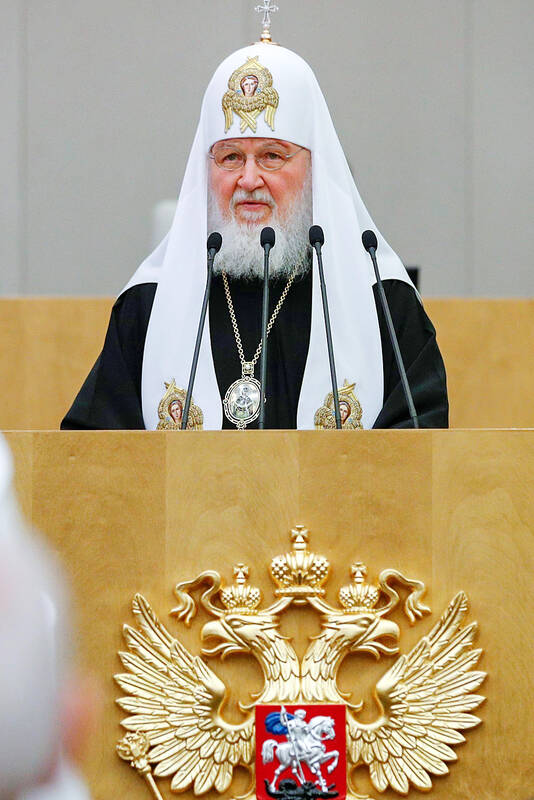The Russian Orthodox Patriarch Kirill, a strong supporter of Russian President Vladimir Putin, worked for Soviet intelligence while living in Switzerland in the 1970s, Swiss newspapers reported, citing declassified archives.
The Swiss police file on the man who today serves as the spiritual head of the Russian Orthodox Church “confirms that ‘Monsignor Kirill,’ as he is referred to in this document, worked for the KGB,” the Sonntagszeitung and Le Matin Dimanche weeklies reported.
The two papers said they had gained access to the file in the Swiss national archives.

Photo: AP / The State Duma
Kirill, who today is a fervent supporter of Putin’s war in Ukraine, lived in Geneva in the early 1970s, officially as a representative of the Russian Orthodox Church at the World Council of Churches (WCC).
‘NOT AN AGENT’
Under the code name “Mikhailov,” Kirill’s mission was to influence the council, already infiltrated by the KGB, the papers said.
The Russian Orthodox Church has refused to comment on Kirill’s spying activity in Geneva, while the WCC had maintained it had no information about the case, they said.
However, the archives showed the Soviet objective was to push the institution to denounce the US and its allies, and to tone down its criticism of the lack of religious freedoms in the Soviet Union, they said.
The patriarch’s nephew Mikhail Gundyaev, who represents the Russian church at the WCC in Geneva, told Le Matin Dimanche that his uncle “was not an agent, although he was subjected to ‘strict controls’ by the KGB.”
And this “did not affect the sincerity of his engagement in ecumenical work with other churches,” Gundyaev said, adding that his uncle had had a special appreciation for Switzerland.
SWISS FAN
Kirill has visited the wealthy, Alpine nation at least 43 times, the paper reported.
He was, among other things, passionate about skiing, even reportedly breaking a leg on the Swiss slopes in 2007.
“Between religious diplomacy, espionage and finances, Kirill has continuously been drawn to the Alps and the shores of Lake Geneva,” Le Matin Dimanche said.
“I have special feelings for your country,” the patriarch said in 2019 upon receiving the president of the upper house of the Swiss parliament.
“Of all the countries in the world, it is possibly the one I have visited the most often,” he said.

Malaysia yesterday installed a motorcycle-riding billionaire sultan as its new king in lavish ceremonies for a post seen as a ballast in times of political crises. The coronation ceremony for Malaysia’s King Sultan Ibrahim, 65, at the National Palace in Kuala Lumpur followed his oath-taking in January as the country’s 17th monarch. Malaysia is a constitutional monarchy, with a unique arrangement that sees the throne change hands every five years between the rulers of nine Malaysian states headed by centuries-old Islamic royalty. While chiefly ceremonial, the position of king has in the past few years played an increasingly important role. Royal intervention was

X-37B COMPARISON: China’s spaceplane is most likely testing technology, much like US’ vehicle, said Victoria Samson, an official at the Secure World Foundation China’s shadowy, uncrewed reusable spacecraft, which launches atop a rocket booster and lands at a secretive military airfield, is most likely testing technology, but could also be used for manipulating or retrieving satellites, experts said. The spacecraft, on its third mission, was last month observed releasing an object, moving several kilometers away and then maneuvering back to within a few hundred meters of it. “It’s obvious that it has a military application, including, for example, closely inspecting objects of the enemy or disabling them, but it also has non-military applications,” said Marco Langbroek, a lecturer in optical space situational awareness at Delft

The Philippine Air Force must ramp up pilot training if it is to buy 20 or more multirole fighter jets as it modernizes and expands joint operations with its navy, a commander said yesterday. A day earlier US National Security Adviser Jake Sullivan said that the US “will do what is necessary” to see that the Philippines is able to resupply a ship on the Second Thomas Shoal (Renai Shoal, 仁愛暗沙) that Manila uses to reinforce its claims to the atoll. Sullivan said the US would prefer that the Philippines conducts the resupplies of the small crew on the warship Sierra Madre,

AIRLINES RECOVERING: Two-thirds of the flights canceled on Saturday due to the faulty CrowdStrike update that hit 8.5 million devices worldwide occurred in the US As the world continues to recover from massive business and travel disruptions caused by a faulty software update from cybersecurity firm CrowdStrike, malicious actors are trying to exploit the situation for their own gain. Government cybersecurity agencies across the globe and CrowdStrike CEO George Kurtz are warning businesses and individuals around the world about new phishing schemes that involve malicious actors posing as CrowdStrike employees or other tech specialists offering to assist those recovering from the outage. “We know that adversaries and bad actors will try to exploit events like this,” Kurtz said in a statement. “I encourage everyone to remain vigilant